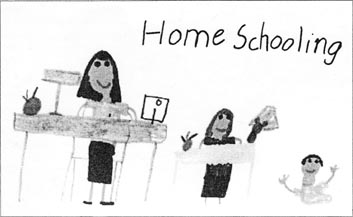No Place Like Home
A Personal Look at the Education of Children: Public, Private, & Domestic
by Leon J. Podles
page 1 2 3
An Unexpected Benefit
The children also are less demanding of material possessions if they are not exposed to school. In my family's case, the difference may not be entirely caused by home schooling. We differ in two additional ways from other American families. We are numerous by American standards (six children, and occasional long-term guests, including my retarded sister who lived with us for several years), and we have never had a television. In addition to exposing children to questionable programs, television cultivates their avarice. Why else do advertisers spend billions each year to reach children?

Although we are moderately affluent, our family income is below the per-capita average of the metropolitan area. We do not have six private-school tuitions to pay, and can therefore afford to live in a neighborhood in which Jaguars dot the street. I was concerned that the children would pick up tastes from neighborhood children that we could not afford to indulge, but my children have never been materialistic. In fact, it is hard to extract requests for birthday presents. My wife's friend who was in the diplomatic corps in Africa visited us once and remarked that our children were more like African children than American children. The older ones took care of the younger and played with them, and they had endless fun with a few sticks and a card- board box.
Our life is hardly monastic; apparently children have to be trained in the American fixation with material objects—and television and school are two of the main agents of propaganda. Since home schoolers from smaller families and from families that allow the occasional use of television often exhibit this lack of interest in possessions, school seems to be the main culprit. By home schooling one can save money and help save the child's soul at the same time (a combination that should appeal to the Scottish Presbyterians among us).
Personal Development at Home
I have noticed several distinctive personality traits in our children and in other home-schooled children, both those I have known and those about whom I have read. Our children have remained more childlike: they don't exhibit precocious maturity. They like playing with their bunnies, and even the fourteen- year- old seems to enjoy playing cars with the five-year-old. But they also are more independent and more self-confident in dealing with adults than most children are.
A child must learn that he is loved if he is to have a chance to know, by analogy, what God's love is, attentive and ever present yet giving us freedom to grow, confident in us, easily pleased, never really satisfied, until we grow up to the full stature of his sons.
Our daughter was terribly shy at school. After a year at home, she began making expeditions around the neighborhood with a homeschooled friend, and independently arranged to participate in a fashion show at a fabric store where she shopped. When my then thirteen-year-old discovered a virus in a laptop computer his uncle had brought home from work, he fixed it, and told his uncle to have the mainframe checked. There was indeed a virus, and the computer expert called my son to see what had happened. My son told the expert what he had done, and suggested alterations to a command path, which the expert did not know were possible. We learned later that not only was he impressed by my son's expertise, but he also was even more impressed by the self-confidence with which he talked to an adult about technical matters.
Wellesley, my wife's alma mater, has a student who had never attended school before going to college. Her parents were 60s types who had moved to the mountains. When their children were old enough for school, they were appalled by the condition of the local schools and decided to teach their three children at home. She had a rigorous and structured education at home with her brother and sister. When she came to Wellesley there were several surprises. She had never heard of eating disorders, but they were common among Wellesley students. She found incomprehensible the complaints that teachers in school had neglected girls; she was relieved by the relative anonymity and lack of attention in the college classroom compared to the scrutiny she had at home. She did not feel at all socially awkward because she lacked the experience of school. Most of all, she discovered that she was more capable of independent thought than her classmates.
Keeping the Faith at Home
I have not touched on religion. Our children were in Roman Catholic schools, but we had already started taking them out one by one because they were so academically out-of-step, although the school is good by American standards.
The final straw was a letter that the eighth graders (mostly girls) wrote, under the direction of their teacher, to the local Catholic newspaper, saying that middle-school students were going to have sex anyway and that the schools should give them condoms. This letter (with some assistance from my fax machine) caused a furor among our school's parents. The official explanation from the damage-control people at school headquarters was that many of the students were Protestant and had picked up these ideas at home. Somehow I couldn't imagine the black Baptist parents who were paying for a Catholic school telling their daughters this; surveys have shown that evangelical Protestants are more conservative than Catholics in sexual matters. I decided that I did not want my daughter to pick up these attitudes, whatever their source.
Unfortunately, because of the massive confusion about doctrine and morality in all denominations, no religious school can be fully trusted to transmit its heritage faithfully. Perhaps the fundamentalist schools do, but their rigidity creates its own problems.
We use Orthodox religion textbooks (the Ignatius Press Faith and Life series) and read Scripture at several points during the day, but the main religious education comes from our use of folk traditions that the liturgical churches in Europe, especially the Catholic and Lutheran, have preserved. We celebrate St. Nicholas with shoes and presents and St. Lucy with the Lucia crown and saffron rolls. Evelyn Vitz's A Continual Feast is full of useful suggestions. She has tested them in her family of six children whom she is rasing in Manhattan. The customs of Christmas have done much to keep a vestige of Christianity alive in American culture; the customs that used to fill the year can implant a deep memory of Christian life in children, whatever they encounter later in life.
An Education in Love

But the chief religious role of home schooling is not in imparting instruction. The family is the social structure that cultivates pietas, and that binds, religare, generation to generation. We desire to spend time with those we love, so that we can get to know them and help them in an intelligent fashion. Teaching, as David Guterson says, "is an act of love before it is anything else." His book, Family Matters: Why Homeschooling Makes Sense, is the best introduction to the legalities, advisability, and desirability of teaching at home, and is suffused with a charm that stems from his delight in his children. Guterson emphasizes that being independently wealthy is not a requirement to teach your children at home; he makes $30,000 a year, and his wife does not work outside the house. He insists that it is not a sacrifice to spend your time with your children, with those to whom you have given existence and whom you love more than anyone in the world. He also teaches at a good public high school, so he knows both types of teaching, and calls for the reform envisioned by Ivan Illich, in which the schools provide opportunities to learn for all. A few enlightened public-school districts have begun a sincere cooperation with home-schooling families, providing them with opportunities to participate in such activities as they desire.
Much may be made of a child if, like Johnson's Scot, he is caught early enough. But what will catch him? A parent's love, which created him and called him into being from nothingness, and that surrounds him every hour of the day, that studies his needs and desires, and tries to help him grow into a being that expresses a unique idea, an idea which Christians know exists in the mind of God? Or will it be what used to be called the world, a society that lives by frivolity and the competitive multiplication of possessions, that forgets to delight in God's creation and in the summit and crown of that creation, the human person?
Both socialism and capitalism tend to view human beings as ciphers who can be manipulated in the service of economic efficiency. Capitalism is better at creating wealth, but at what cost? First fathers were taken away from their children, more than primitive societies ever had done. Now mothers are being taken away from their children, and the children turned over to strangers. A child must learn that he is loved if he is to have a chance to know, by analogy, what God's love is, attentive and ever present yet giving us freedom to grow, confident in us, easily pleased, never really satisfied, until we grow up to the full stature of his sons. Often a home is the best environment in which to raise and instruct a child in the household of the faith.
Published by TOUCHSTONE, A Journal of Ecumenical Orthodoxy, Fall 1994
Volume 7 , Number 4.
|
